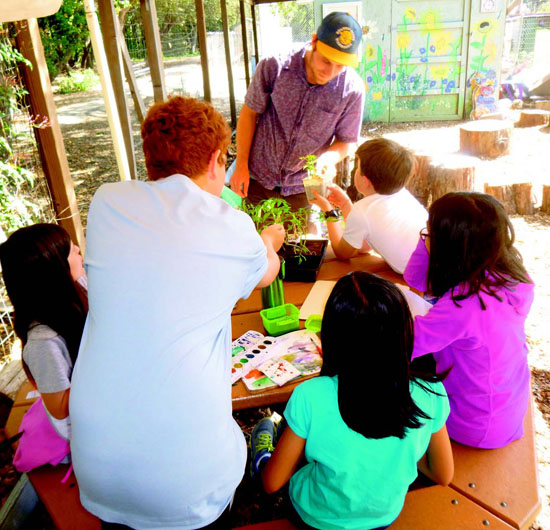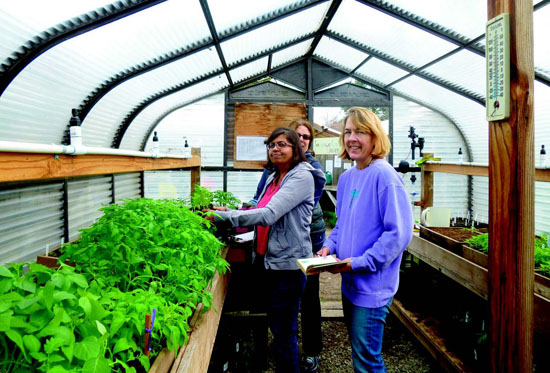|
|
Published March 25th, 2015
|
Spreading Seedlings and the Love of Growing Food
|
|
| By Sophie Braccini |
 |
| Del Rey teacher John Moran and students decide what to do with the seedlings they received. Photos Sophie Braccini |
Sitting around their teacher Mr. Moran in the Del Rey Elementary School garden, fourth- and fifth-grade students were attentive and relaxed. They used this recent weekly outing to the garden to paint, and to plant the seedlings that were given to their teacher by the Moraga Gardens Farm.
 The community farm sent hundreds of plants, grown from seedlings, to Del Rey and other Lamorinda schools. The group also planted seedlings at the farm and plans to sell those during a spring fundraiser to help support the nonprofit.
The community farm sent hundreds of plants, grown from seedlings, to Del Rey and other Lamorinda schools. The group also planted seedlings at the farm and plans to sell those during a spring fundraiser to help support the nonprofit.
 "This year we are giving seedlings to the Global Student Embassy high school gardens (Campolindo, Miramonte, Las Lomas, and Acalanes), as well as JM (Joaquin Moraga Intermediate), Rheem (Elementary), Canyon, Stanley (Middle School), Del Rey (Elementary), Diablo Valley College's Adaptive Horticulture program and Saint Mary's College," said Nita Mehta, the garden volunteer in charge of the donations.
"This year we are giving seedlings to the Global Student Embassy high school gardens (Campolindo, Miramonte, Las Lomas, and Acalanes), as well as JM (Joaquin Moraga Intermediate), Rheem (Elementary), Canyon, Stanley (Middle School), Del Rey (Elementary), Diablo Valley College's Adaptive Horticulture program and Saint Mary's College," said Nita Mehta, the garden volunteer in charge of the donations.
 Last year the garden received requests for plants from as far as Turlock, but members decided to focus on Lamorinda schools this year. "We started to plant our seedlings in the ground immediately," said Del Rey's Moran, even though he knew the recommendation was to wait for April. "It's been crazy weather, and the kids were interested in doing it." The teacher showed students the five different breeds of tomatoes he received from the farm, including tomatillos that immediately drew exclamations of appreciation from the savvy young gardeners. "I enjoy observing the different plants in the garden," said one young student, Lauren. "The dahlias, the garlic, the artichokes, the beans. We even have a thorn-less blackberry bush, I had no idea that existed."
Last year the garden received requests for plants from as far as Turlock, but members decided to focus on Lamorinda schools this year. "We started to plant our seedlings in the ground immediately," said Del Rey's Moran, even though he knew the recommendation was to wait for April. "It's been crazy weather, and the kids were interested in doing it." The teacher showed students the five different breeds of tomatoes he received from the farm, including tomatillos that immediately drew exclamations of appreciation from the savvy young gardeners. "I enjoy observing the different plants in the garden," said one young student, Lauren. "The dahlias, the garlic, the artichokes, the beans. We even have a thorn-less blackberry bush, I had no idea that existed."
 Moran is a garden enthusiast who believes that it is important to take the students outside to learn. "We do a lot of science in the garden," he said. "We do a lot of writing, I teach social studies, we make decisions about what to plant, and we have Julia Grimsrud who teaches Math in the Garden." The teacher believes that the people who struggle inside are at peace outside, and many of his students mention the pleasure and beauty they find in the garden.
Moran is a garden enthusiast who believes that it is important to take the students outside to learn. "We do a lot of science in the garden," he said. "We do a lot of writing, I teach social studies, we make decisions about what to plant, and we have Julia Grimsrud who teaches Math in the Garden." The teacher believes that the people who struggle inside are at peace outside, and many of his students mention the pleasure and beauty they find in the garden.
 Claire Curtin came to the Moraga Gardens Farm to pick up plants for the four high schools and the Global Student Embassy program. The high school project's goal is to grow food sustainably and giving it to local food banks. "Our focus is on sustainable agriculture and leadership," said the program's manager Chrissy Orangio. "The students also study sustainable farming techniques from around the world and strive to make a difference here, while they are in school." Like most of the gardens, this program depends on donations, and Orangio is appreciative of the fact that the communities here are very supportive and generous, from the Moraga Gardens Farm and the seedlings, to hardware stores, local nurseries and, of course, parents.
Claire Curtin came to the Moraga Gardens Farm to pick up plants for the four high schools and the Global Student Embassy program. The high school project's goal is to grow food sustainably and giving it to local food banks. "Our focus is on sustainable agriculture and leadership," said the program's manager Chrissy Orangio. "The students also study sustainable farming techniques from around the world and strive to make a difference here, while they are in school." Like most of the gardens, this program depends on donations, and Orangio is appreciative of the fact that the communities here are very supportive and generous, from the Moraga Gardens Farm and the seedlings, to hardware stores, local nurseries and, of course, parents.
 Joaquin Moraga Intermediate School teacher Dawn Lezak came to pick up plants. She teaches the Earth Stewardship Class that's part of the 'wheel' curriculum where sixth-grade students get to experiment with the different electives JM has to offer. "I see most of the students for 35 days," explained Lezak, who uses the school's garden extensively. She teaches about solar dials, being aware of the weather, good bugs and bad bugs, endangered species, herbicides and pesticides and the alternatives to using chemicals.
Joaquin Moraga Intermediate School teacher Dawn Lezak came to pick up plants. She teaches the Earth Stewardship Class that's part of the 'wheel' curriculum where sixth-grade students get to experiment with the different electives JM has to offer. "I see most of the students for 35 days," explained Lezak, who uses the school's garden extensively. She teaches about solar dials, being aware of the weather, good bugs and bad bugs, endangered species, herbicides and pesticides and the alternatives to using chemicals.
 "The children get in pairs, do the research on a topic they choose, and write a report that they present to the class," said Lezak. The students also have to solve problems occurring in the garden, such as the rabbits' invasion that threatened their Brussels sprouts. "I asked them to figure out a way to keep the rabbits out," she said. "Two teams started to build mesh cages around the sprouts." She added that this year the students have been able to spend four out of every five days a week in the garden for their Earth class. Ultimately, what is produced in the garden goes to the Foods class that's also part of the wheel.
"The children get in pairs, do the research on a topic they choose, and write a report that they present to the class," said Lezak. The students also have to solve problems occurring in the garden, such as the rabbits' invasion that threatened their Brussels sprouts. "I asked them to figure out a way to keep the rabbits out," she said. "Two teams started to build mesh cages around the sprouts." She added that this year the students have been able to spend four out of every five days a week in the garden for their Earth class. Ultimately, what is produced in the garden goes to the Foods class that's also part of the wheel.
 "We want to participate in the very worthy programs that teachers get going," said Mehta. "The kids will grow up with a love and respect of the land and sustainable gardening, and it benefits us and our community in the end."
"We want to participate in the very worthy programs that teachers get going," said Mehta. "The kids will grow up with a love and respect of the land and sustainable gardening, and it benefits us and our community in the end."


|
 |
| Dawn Lezak, right, and Nita Mehta choose seedlings in the Moraga Gardens Farm green house. |
|
|
|
|
|
|
| |
|
|
|
|






